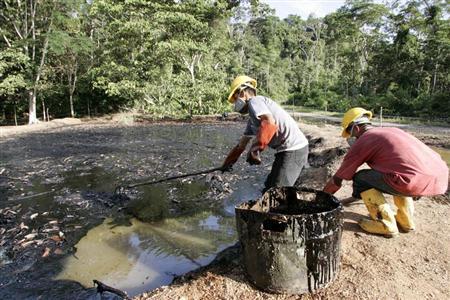U.S. trial ends over Ecuador pollution judgment against Chevron
Date: 27-Nov-13
Country: USA
Author: Joseph Ax

Oil workers clean up a contaminated pool in Taracoa December 10,
2007.
Photo: Guillermo Granja
An attorney for Chevron Corp on Tuesday accused U.S. lawyer Steven Donziger of orchestrating an international criminal conspiracy by using bribery and fraud in Ecuador to secure a multibillion-dollar pollution judgment against the oil company.
"It was a scheme so audacious, so bold, that it would make even a Mafia boss blush," lawyer Randy Mastro said during his closing argument before U.S. District Judge Lewis Kaplan, who is presiding over the non-jury trial.
Lawyers for the defense said Chevron had failed to prove Donziger's involvement in any conspiracy.
"Raw accusations and allegations are not proof," said Zoe Littlepage, a lawyer for Donziger. "Steven Donziger may be a jerk. That's not a crime."
The six-week trial concerned an $18 billion judgment issued in 2011 against Chevron by Judge Nicolas Zambrano in Ecuador. The ruling was in favor of a group of villagers, who claimed Texaco had contaminated an oil field in northeastern Ecuador between 1964 and 1992. This month, Ecuador's Supreme Court cut the amount to $9.5 billion.
Chevron, which later acquired Texaco, has said Texaco remediated the site before closing operations. The company hopes a verdict from Kaplan that the judgment was based on fraud will help it defend against attempts to enforce the judgment outside Ecuador.
Kaplan will not render a decision right away; the two sides will submit post-trial briefs over the next couple of months.
During the trial, Chevron submitted reams of documents, including Donziger's private notebook. The company also called more than a dozen witnesses, including linguistics, psychology and computer experts who testified that Zambrano could not possibly have authored the judgment without assistance.
JUDGE VERSUS JUDGE
But the case could come down to whether Kaplan chooses to believe Zambrano, who said on the stand that he wrote the decision alone, or another former Ecuadorean judge, Alberto Guerra, who testified that Donziger's side paid him to ghost-write Zambrano's opinion.
Guerra, perhaps the key trial witness, said Donziger was aware of the bribes, while Donziger said during his own testimony that he rejected a solicitation for bribes by Guerra.
Mastro pointed to sections of Zambrano's opinion that appeared to be lifted word-for-word from internal documents held by Donziger's team in Ecuador, complete with the occasional error.
"It's like fingerprints," he said. He also pointed to records that showed money withdrawn from an account used by Donziger's team and funds in the same amounts deposited into Guerra's own account soon after.
But Littlepage said Chevron's entire case came down to the word of a witness, Guerra, who simply cannot be credited.
"It is based on the testimony of a single witness, an admitted liar, and one whose story has changed many times," she said.
Mastro also pointed to evidence that an independent expert appointed by the Ecuadorean court to assess Chevron's liability was secretly compensated by Donziger's team and had much of his report ghost-written by a consulting firm hired by Donziger.
Littlepage, however, said that Zambrano specifically threw out the report before issuing his opinion and that two appellate courts in Ecuador had since upheld the judgment without reference to the report.
Without a causal connection between the report and any alleged harm to Chevron, she said, Chevron cannot pursue fraud claims based on the report as a matter of law.
In the end, the two sides offered sharply divergent portraits of Donziger. Richard Friedman, one of his lawyers, said Donziger deserved enormous credit for shedding light on how U.S. corporations treat "Third World countries."
But Mastro said Donziger had "shamed our profession" by lying, obstructing justice and ignoring the rule of law.
"Lawyers don't do these things," he said. "Criminals do."
The case is Chevron Corp v. Steven Donziger et al, U.S. District Court for the Southern District of New York, No. 11-0691.
(Reporting by Joseph Ax; Editing by David Gregorio)
![]()
© Thomson Reuters 2013 All rights reserved